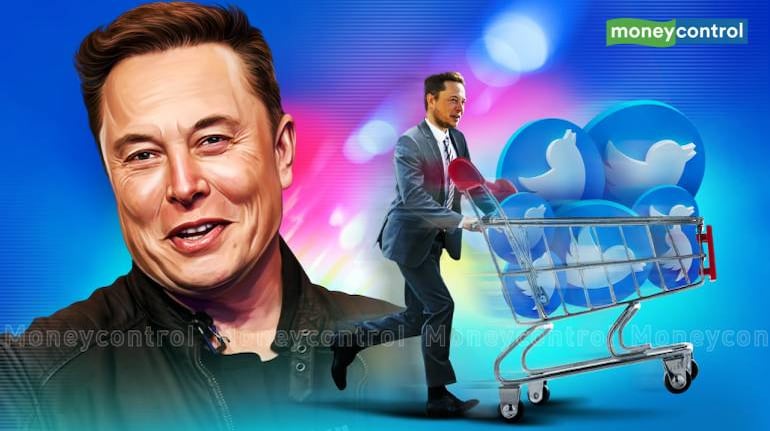



In a truncated trading week, the biggest news was Elon Musk’s bid to acquire Twitter for $54.20 per share in cash and take it private. A few days ago, the maverick entrepreneur had revealed that he was the largest shareholder in the social media company with a 9.2 percent stake (since then, he has been dethroned by Vanguard Inc).
He followed that up with a series of tweets (some of them since deleted) criticising the way the social media company was run. Later, he was invited to be part of Twitter’s board of directors, which he rejected.
Musk’s offer is at a premium to Twitter’s Thursday closing price of $45. That said, Twitter shares have traded at a peak of $77 about 14 months earlier.
In a tweet, Saudi Arabian Prince Alwaleed bin Talal, a long-term Twitter shareholder, said the proposed offer does not come close to the intrinsic value of Twitter given its growth prospects.
Twitter said its board will “carefully review the proposal to determine the course of action that it believes is in the best interest of the company and all Twitter stockholders”.
However, on Friday, Bloomberg reported that Twitter is considering adopting a poison pill strategy to fend off Musk’s hostile takeover attempt.
In a poison pill strategy, existing shareholders get the right to buy additional shares at a discount. This effectively dilutes the ownership interest of a new, hostile party.
The big question is where will Musk find the cash to fund this acquisition? As this FT report (free to read for Moneycontrol Pro subscribers) notes, on paper he is worth $260 billion, according to the Forbes Rich List. Selling stakes in Tesla and SpaceX would be easy, but there would be huge tax implications. Note also that his shares in Tesla are already heavily pledged. Leveraging Twitter’s earnings to raise funds will also not raise much.
Sure, he could take the help of private equity investors to raise funds, but this only adds to scepticism about whether he is actually serious about the offer. Remember the time when he wanted to take Tesla private and said funding was secured, when it wasn’t.
For all his remarkable success as an entrepreneur, Musk plays to the gallery with a lot of attention-grabbing tactics. The question of whether he is the right person to run Twitter is another thing altogether. This Bloomberg Columnist strongly argues here he is not!
The other issue of the week which caught our attention has been around for some time – inflation. India’s consumer price inflation number for March came in at 6.95 percent and was quite broad-based. As we pointed out, the rise in prices was across the board, ranging from food to footwear to kerosene and diesel to gold and silver.
Much of this is owing to global factors — there are supply issues, many of which started during the pandemic and have now been exacerbated by the war in Ukraine. Global food prices are the prime example of inflation caused by the war.
There is no end in sight soon. Metal stockpiles are shrinking as energy prices hit production, says this piece. We pointed out how the spike in transport costs could be structural and last for some time.
This rise in inflation is happening a time when – at least in India – growth is not picking up as fast as desired. RBI’s last consumer confidence survey reported a bleak outlook for discretionary consumption.
It all boils down to how these supply shortages are tackled. The stress in commodity markets may necessitate central bank support, this FT piece argues. Ultimately, a co-ordinated solution will be the way out and can China teach the West a lesson on managing inflation, a columnist wonders.
This week was also the start of the earnings season. Our research team was busy analysing TCS’s and Infosys’s fourth quarter results. It also put out notes on Housing Finance, Maruti, Hindustan Aeronautics, Dodla Dairy, Sterling Wilson Renewable Energy, AMC stocks, Karur Vysya Bank, and Alufluoride.
Other Picks of the Week
The hard truth is India has an insatiable demand for coal
Ruchi Soya acquiring Patanjali’s food business is investor-friendly, but how will it fund the buy?
Crypto Conversations: Why Ukraine’s crypto-powered crowdfunding is a watershed moment
Why the reintroduction of the ‘Do Not Exercise’ facility is healthy for traders
Decoding PLI: Turbo-charging green mobility and self-reliance in auto sector
Learning from the failures of funded businesses
The great Chinese white elephant of Sri Lanka
Institutional investors are flexing their ESG muscles
Tech Mantra: Moving beyond backup to data resiliency
IMF paper supports the case for distributing free food
The Eastern Window: China’s clout in Pakistan comes under a cloud
UN climate report — Will the world take note and act fast?
Between digital assault and regulation, NBFCs have it tough
Textile industry at a crossroads on soaring cotton prices
Tailpiece: Serious or not, right or not, Musk’s offer has unleashed a lot of jokes and memes. Snapdeal CEO Kunal Bahl shared a message he received on Whatsapp, which said the offer price of $43 billion was at par with Sri Lanka’s debt. “He can buy it and call himself Ceylon Musk,” Bahl wrote on the microblogging web site.
Your regular Weekender correspondent Manas Chakravarty returns next week.
Cheers,
Ravi Krishnan
Discover the latest Business News, Sensex, and Nifty updates. Obtain Personal Finance insights, tax queries, and expert opinions on Moneycontrol or download the Moneycontrol App to stay updated!
Find the best of Al News in one place, specially curated for you every weekend.
Stay on top of the latest tech trends and biggest startup news.